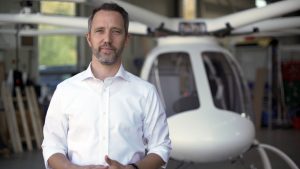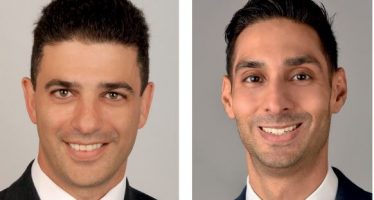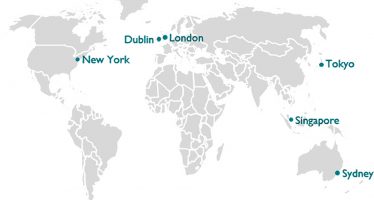Florian Reuter, Volocopter: ‘Pragmatic Excellence’, Transparency, and the World of Urban Air Mobility

CEO: Florian Reuter
Florian Reuter has been at the helm of urban air mobility pioneer Volocopter almost since its inception, steering the company from strength to strength.
Volocopter was born in 2010 when the founders met in an online forum for tech enthusiasts. Their discussions sparked the creation of a company to operate stable, safe drones as passenger aircraft. The first prototype, in 2011, used a yoga ball as a landing gear. It was enough to score Volocopter a place in the Guinness World Records as the first crewed electric multicopter — and to elicit a call from NASA.
The future-forward aircraft manufacturer, with offices in Germany and Singapore, launched public test flights in 2017. It has since been staging demonstrations in major cities to give people a taste of the future.
In 2022, Volocopter has 500 employees and three purpose-built aircraft — the VoloCity, VoloConnect, and VoloDrone — that meet the same aviation safety standards as commercial airliners. It has also designed the digital and physical urban air mobility (UAM) infrastructure to match (the VoloPort and VoloIQ).
A steady stream of capital and specialist knowledge, and collaborations with aviation authorities, business partners, and governments, has made the firm a leader in certification — and it’s on track to become the first electric air taxi on the global market.
How soon can UAM become part and parcel of our daily lives?
Florian Reuter: There has been very rapid progress. Our short-term goal — something we are very close to achieving — is to secure certification from the European Union Aviation Safety Agency (EASA) for our VoloCity air taxi.
We aim to do this in time for the 2024 Paris Summer Olympics. We will then be able to launch commercial services with piloted aircraft as well as tourist flights and other dedicated services.
The move into the third dimension will trigger a fundamental shift in our mobility system. To fully exploit this potential, we need to interact with the public early on and clearly communicate the benefits and challenges associated with UAM.
What are the next steps?
We’ll start small, with dedicated routes, before we expand the UAM network over the next decade to offer cross-border services in certain regions, such as between Singapore and Malaysia. We’ll also be working toward offering autonomous flight routes, in coordination with local civil aviation authorities.
What legislative or regulatory changes would you like to see?
Collaboration with regulators around the globe has been refreshing; regulators are certainly not hindering innovation. In the case of eVTOLs and UAM they have been real enablers.
One topic that is particularly important to us is globally integrated air traffic management (ATM) standards that apply to the lower airspace where UAM and advanced air mobility (AAM) aircraft will operate. This is a new sector with its own technology, so there is a pronounced need for established global regulatory systems.
Volocopter is based in Germany, and we’re working closely with the EASA to adapt our UAM to existing ATMs. We have performed tests at major international airports, such as Frankfurt. Other countries have their own systems and authorities, and we will need to adhere to their requirements as well.
What is special about your organisation’s management style?
Volocopter champions transparency, open communication, and flat hierarchies. We share as much information as possible with our employees. We encourage innovation and invention, recognise the hard work done by individuals, and we give praise every single week. This has created a strong, unified company culture that helps us move toward our common goal.
What are your team’s key strengths?
Diversity and agility. Our 500-strong team come from various professional backgrounds, including aviation and aerospace, business, automotive, and engineering.
In our mission to attract the world’s finest talent, we adopted English as our working language when we were a group of eight Germans. As a start-up, we needed the company and its diverse workforce to quickly adapt and grow.
One core vision is “pragcellence,” a word we created that means “pragmatic excellence.” We are sensible, realistic, and practical in everything we do, while being excellent in our execution.
What advice would you give industry newcomers?
Always put safety first, and prepare for the long haul. It’s easy to make announcements, show renderings, and even fly prototypes. But the challenges start rolling in when you start flying people and move toward certification for commercial operations.
At those times, the challenge — and the resources and time required — increase by an order of magnitude. Achieving certification may be an arduous task, but it is an essential one. It was of paramount importance to start working with regulators worldwide early on.
At the end of the day, the safety of those on board and on the ground are our top priorities.
You may have an interest in also reading…
KwaZulu-Natal Joint Municipal Pension/Provident Funds: Challenges and Transformation for South African Fund as it Navigates the Future for All its Stakeholders
South Africa’s most awarded Retirement Fund, the KwaZulu-Natal Joint Municipal Pension/Provident Funds (NJMPF) proudly announced on the 1st of July
PGM Global Inc: Global Recognition Rewards Niche Services, Transition Management, and a Comprehensive Strategy
PGM Global Inc was founded in Canada as an institutional, agency-only broker-dealer — and for more than half a century,
GoldenTree: Governance and Experience Equate to Winning Formula for Investment Firm that Boasts the Golden Touch
Asset management firm GoldenTree’s strong governance structure has been key to its success throughout its 20-year history. GoldenTree is, and

















































































